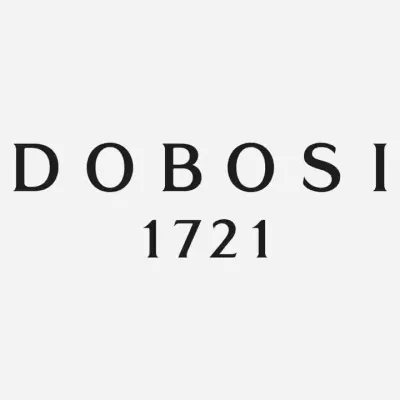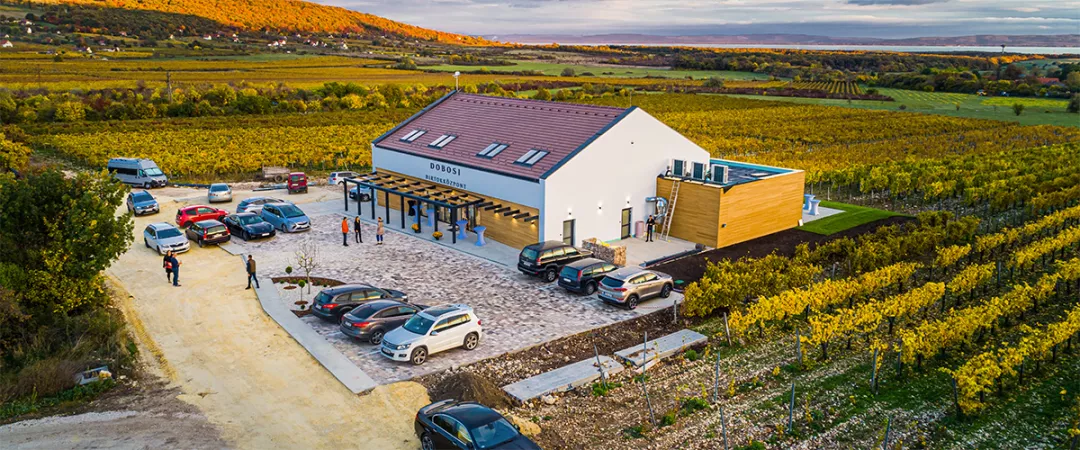General information
RDP Priority
- P6. Social inclusion and local development
RDP Focus Area
- 6A: Diversification & job creation
RDP Measure
- M06: Farm & business development
Beneficiary type
- Small-Micro Enterprise
Summary
The Dobosi family has been producing grapes and wine in Hungary’s Nivegy Valley since 1721. Currently, the company owns 25 hectares of organic vineyards and leases another five hectares. More than ten types of grapes are grown to produce a wide selection of white, red and rosé certified organic wines. In 2018, the family farmers decided to diversify their activities by launching an accommodation and leisure service.
Previous LEADER support for the firm helped prove the potential for agri-tourism expansion. This evidence catalysed new CAP co-funding (from a Rural Development Programme measure for farm and business development) to construct a 600 m2 building. It houses eight guest rooms, a retail shop, a tasting and event space, and a panoramic terrace. Business growth succeeded in providing more family members with stable incomes allowing them to live and work in their area, supporting its generational renewal.
Results
Τhe accommodation development has been very successful as shown by:
- Income increased by more than fourfold to EUR 735 000 (from EUR 165 000 per year before the development to more than EUR 900 000 per year).
- The eight rooms have been at 50% occupancy throughout the whole year. This can be said to be very good considering the seasonality of the Balaton region, as the tourist season is limited to mainly the summer months and some holidays.
- The EAFRD support helped the overall development of the winery and increased the number of full-time employees from nine people in 2018 to 26 in 2024.

Promoter
Dániel Dobosi
Funding
Total budget 600 000 (EUR)
EAFRD: 120 000 (EUR)
National/Regional: 30 000 (EUR)
Private/own: 450 000 (EUR) including own resources + bank loan + EUR 50 000 crowdfunding
Ressourcen
Documents
Links
Context
The Dobosi Winery produces a wide selection of white and red wines and rosés, using varieties such as the Italian Riesling, Rhine Riesling, Sauvignon Blanc, Tramini and three Hungarian grape varieties, namely, Juhfark, Kéknyelű and Kékfrankos. Their wines have won several national and international awards. The winery also produces pálinka (a traditional Hungarian spirit), grape juice, grape seed oil, grape seed extract, etc. Sales are mostly made direct to the consumer in Hungary, and 60% of their wines are sold in the shop located on the estate, in their restaurant or through their web shop.
Wine tastings, visits and events were often organised at the Dobosi Winery, and since there is zero tolerance for driving while drinking in Hungary, if a group of friends, or the employees of a company wanted to participate in these events, their designated drivers must attend as observers only. Thus, a demand was identified to create an overnight accommodation offer, where participants could spend the night if necessary.
As a first step, in 2014, they used LEADER support to create five guest rooms in the attic of the family house. In the first year, they attracted 1 500 guest nights with these rooms. The high level of use was a clear sign of a demand for much more accommodation.
The farmers saw an opportunity to increase employment options for family members and this second CAP investment project was funded to expand the agri-tourism business.
Objectives
The main objectives of this investment project were to further develop the wine estate and increase the accommodation capacity so that the winery could organise more and new types of events (e.g. weddings, local wine festivals, etc.). The growth of the business would also generate an increased income for the owners providing more family members with stable incomes to live and work in their area, supporting its generational renewal.
Activities
CAP funds were used to build a 600 m2 guesthouse that houses a retail shop, a tasting and event space, and a panoramic terrace. The application only covered the construction expenses of the guesthouse. The equipment, as well as the design of the winery’s restaurant and wellness space, were not supported by the EAFRD.
Construction started in April 2019 and lasted a little over a year. It was completed in October 2020. A contractor from the village was entrusted with the bulk of the construction, and they tried to buy all materials and services locally.
Unexpected factors (i.e. COVID-19 pandemic and inflation crises) created a financial need for additional fund-raising activities. The company made a crowdfunding campaigning video in which they presented how they are doing with the development and announced a voucher option called ‘Friendship builds’ to their closest clientele. Supporters paid various amounts through the web shop, which could be spent on anything in the built accommodation, restaurant and winery. The contributors received a 15-20% discount for 2-3 years and their names would be written on the wall of the completed building.
Main results
- The income of the estate has increased significantly, from approximately EUR 165 000 per year before the development to more than EUR 900 000 per year. Their guests are from all over the world all year round, including from Europe, USA, South Korea, etc.
- The eight rooms that were built, which can accommodate 16 (+8 people with extra beds) were at 50% occupancy throughout the year. This can be said to be very good considering the seasonality of the Balaton region (the season covers the summer months and maybe some holidays).
- The success of the development is also demonstrated by the fact that instead of hiring one more person, as envisaged in the application, they have employed a lot of extra people. It is difficult to separate the results of the restaurant and wellness developments, which did not receive EAFRD support, but before 2018, nine people worked full-time on the estate and this has now grown to 26.
- In just one month of crowd funding, the family were able to collect a total of EUR 50 000 from 93 people, with which they solved their cash-flow problem and saved the development and the property.
- Business growth succeeded in providing more family members with stable incomes allowing them to live and work in their area, supporting its generational renewal.
Key lessons
- CAP funds can help diversify rural economies and significantly boost individual business incomes.
- Crowdfunding helped the family save their rural tourism project following the COVID-19 pandemic and rising inflation.
- The COVID-19 pandemic had a major impact on the tourism sector. This situation only really settled down by 2023, so this can perhaps be considered a base year.
- As a positive experience, the Paying Agency (the Hungarian State Treasury) was extremely helpful with the entire development in the face of the emerging COVID-19 situation. It did everything possible to help the Dobosi family overcome the difficulties.
- So far, the accommodation development seems to be very successful. According to the call for tenders, at least 50% of the beneficiary’s income must come from agricultural activities during the maintenance obligation (i.e. five years). The company is on the edge of exceeding it and they must work to prevent this from happening.
Wine takes two paths. One goes from the grape seed to the bottom of the bottle. The other starts when we let it out of the bottle. Our family follows nature's wisdom and measures in both ways
Our organic farming combines the tradition of centuries and the innovations of the present without any chemicals.
Our wine estate provides all gastronomic and social experiences so that the aroma reaches the heart beyond the senses.
Contact Information
Email: info@dobosi.com
